We’ve all been there: Spring is in full swing and summer’s closing in fast, and you’ve run out of time to launch into a full three-month weight-loss plan to reach your summer-body goals.
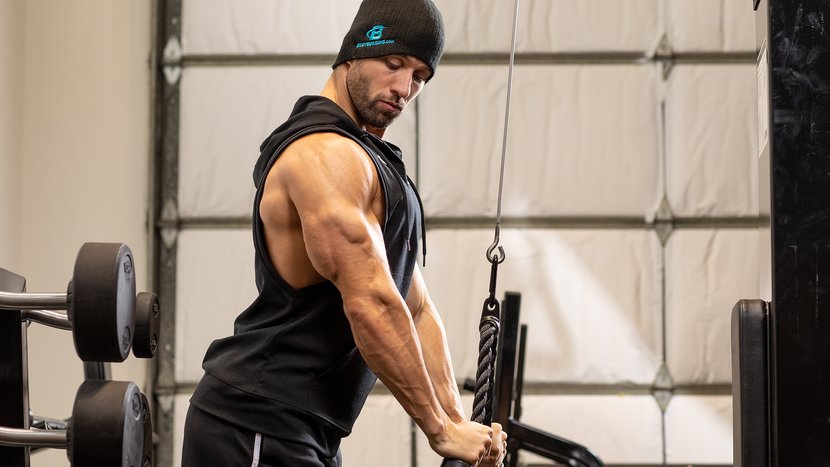
Lucky for you, there’s another way to score that summer six-pack.
Simply drop a few quick fat-burning workouts into your current training program, and kick-start your efforts to lean down without drastically changing your routine.
We have five fat-blasting programs—courtesy of Gym2k.com Signature team athletes Julian "The Quad Guy" Smith and IFBB bikini pro Taylor Chamberlain—that take the guesswork out of your summer weight-loss plan.
With your choice of glutes and hamstrings, back and core, full-body circuits, arm supersets, and a chest-and-shoulder smackdown, you can mix and match these workouts to fit your weekly split, move some serious weight, and have fun in the process.
It’s the no-thinking, no-planning, "grab and go" workout solution for your leanest summer yet!
Workout 1: Taylor Chamberlain’s Glute-Ham Lower-Body Blast
"The glutes and hamstrings are often a trouble spot for women," Chamberlain explains, "but guys can benefit from this workout, too."
Taylor Chamberlain’s Glute-Ham Lower-Body Blast
Technique Tips
Barbell Good Morning/Back Extension: Keep your spine straight as you hinge from the hips on your barbell good morning, being careful to keep your neck neutral and your shoulders in line. During the back extensions, tuck your chin and round your upper back to help engage your glutes.
Standing Calf Raise: Aim for a full stretch at the bottom of each rep, holding for a count of one. Maintain this control and avoid bouncing out of the bottom to lift yourself back up.
Barbell Hip Thrust/Single-Leg Hip Thrust: You may want to prep two barbells for this superset so you can quickly switch to a lighter weight if need be for the single-leg version, which is the same as the regular hip thrust, only with one leg lifted off the ground.
Single-Leg Deadlift: Keep your non-working leg straight and lift it up and out behind you as you descend. This serves as a counterbalance for your body. Press your body weight back into the heel of your standing leg and keep your hips and shoulders square as you lower down for each repetition.
Smith Machine Reverse Lunge: The Smith machine version is exactly like the barbell reverse lunge version of this exercise, providing extra stability so you can focus on the action of your legs instead of maintaining your balance.
Wide-Stance Barbell Squat: Take a full 4 seconds to lower yourself into the squat. Go as deep as you can without letting your heels lift up. Your goal is to get to a point where your thighs are at least parallel to the floor.
Single-Leg Hamstring Curl: Most leg curl machines have just one long roller to accommodate both feet. For single-leg curls, shift your body slightly on the machine so your ankle is hitting in the center of the footpad. Otherwise, you might put undue stress on your knee.
Workout 2: Julian Smith’s Back, Traps, and Core Routine
"The back and core work synergistically, making them a good, dynamic muscle pairing for a high-energy-burn weight-training session," explains Smith. "This workout is front-loaded with four back-focused supersets. Then, you’ll switch and do traps and abs in a superset to wrap it up."
Julian Smith’s Back, Traps, and Core Routine
Barbell Deadlift
5 sets, 12, 10, 8, 6, 4 reps
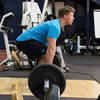
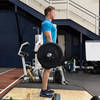
Wide-Grip Pull-Up
5 sets, 12, 10, 8, 6, 4 reps
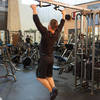
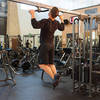
Pendlay Row
4 sets, 12 reps
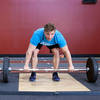

Straight-Arm Pulldown
4 sets, 12 reps

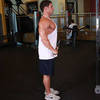
Barbell Shrug
5 sets, 8-12 reps
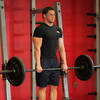
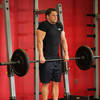
Dumbbell Shrug
Perform seated.
5 sets, 8-12 reps
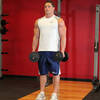
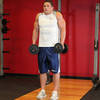
Hanging Leg Raise
4 sets, failure
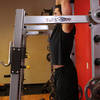
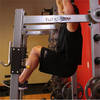
Decline Crunch
4 sets, failure
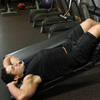
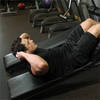
Technique Tips
Deadlift/Wide-Grip Pull-Up: Working down to 4-rep sets is not the norm in fat-burning training, but this workout pushes the pace to increase your anaerobic burn. Rest no more than 1-2 minutes between supersets. You may not be able to handle as much weight by the time you get down to 4 reps as you could had you taken a 3-4 minute rest between sets. However, what you lose in resistance, you’ll make up for in total intensity as the training volume builds over the course of the workout.
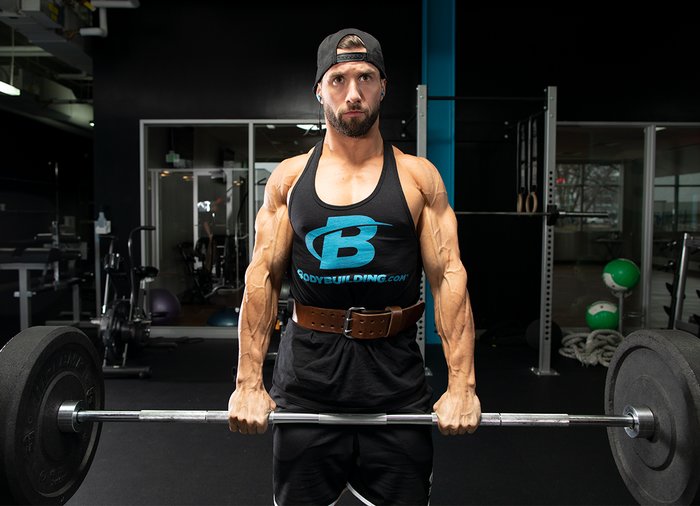
Wide-Grip Lat Pull-down/Incline Dumbbell Row: For this superset, strive for a rep cadence of 1:2:1:2, meaning a 1-second negative with a 2-second pause at the starting position, then an explosive 1-second positive and 2-second pause at the fully flexed position. Do this for each exercise, maintaining correct form the entire time.
Barbell Pendlay Row/Straight-Arm Pull-down: On this superset, change up your rep cadence to 4:2:1:2: a 4-second negative, 2-second pause, explosive 1-second positive contraction, then another full 2-second pause, holding the contraction.
Close-Grip Lat Pull-down/Reverse-Grip Bent-Over Barbell Row: Try to remain upright when doing the close-grip pull-down, pulling the handle down to your upper chest and resisting the urge to lean away or arch your lower back. If you lean back, you’ll turn the movement into more of a seated cable row.
Barbell Shrug/Seated Dumbbell Shrug: On this superset, speed up your rep cadence to 1:0:1:2, doing the concentric portion of each rep explosively with no pause before the contraction and a 2-second hold at the top.
Hanging Leg Raise/Decline Crunch: If you have it in you, you can do an additional seventh superset after this ab pairing, choosing two more core movements such as reverse crunches and crunches, decline twisting crunches and 30-second planks, or V-ups and dragon flags.
Workout 3: Taylor Chamberlain’s Double Full-Body Circuit
"These two circuits will get you moving in multiple directions," Chamberlain explains. "It’s not about focusing on one body part, it’s about getting everything moving and working together to burn calories while building up strength endurance."
Taylor Chamberlain’s Double Full-Body Circuit
Technique Tips
You can tackle the first exercise one of two ways: Either walking forward with each lunge so you move across the floor, alternating legs with each step; or by stepping forward with your right leg, then stepping back to the starting position before stepping forward with your left leg.
Next, tackle your burpees head-on with maximum energy, and those 10 reps will fly by in no time.Switch gears to a front squat push press—also known as a barbell thruster—choosing the weight based on what you can press, not what you can squat.
For the bicycle crunch, don’t interlace your fingers behind your head and yank on your neck. Instead, rest your hands lightly on the back of your head to help support your head on your neck with your fingertips barely touching each other.

If a spin bike isn’t available, a traditional stationary or recumbent bike will do. Whichever you use, go all-out for 20 seconds before moving on to the jump squats.
If you have trouble getting deep enough on your jump squats, try touching your hands down on the floor between your knees on each rep. For the reverse lunge/biceps curl combo, choose a weight based on what you can handle for the curl.
For the plank, don’t let your hips sag to the floor as you tire. Continually correct your posture as needed so your body remains straight from head to heels.
Workout 4: Julian Smith’s Arm-Blast Workout
"Biceps, triceps, and forearms are smaller body parts, but you can still bump up your metabolism if you’re lifting hard and pushing on your rest periods," Smith says. "Keep your rest to 30-60 seconds between supersets and trisets, and don’t stop at all within those combos except to change from one move to the other."
Julian Smith’s Arm-Blast Workout
Barbell Curl
5 sets, 12, 10, 8, 6, 4 reps
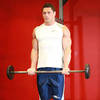
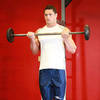
EZ-Bar Skullcrusher
5 sets, 12, 10, 8, 6, 4 reps
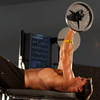
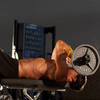
Triceps Pushdown
W-bar attachment.
5 sets, 15 reps
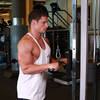
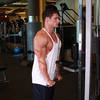
Seated Dumbbell Curl
5 sets, 15 reps (alternating)
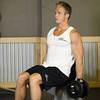
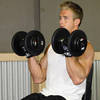
Hammer Curls
5 sets, 12 reps
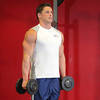
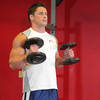
Seated Triceps Press
5 sets, 12 reps
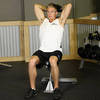
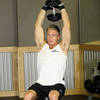
Technique Tips
Standing Barbell Curl/Flat-Bench Skullcrusher: You can trade out a barbell for an EZ-bar or vice versa for either of these movements. Both bars offer a different feel and have slightly different muscle recruitment patterns due to the shift in wrist position. The choice is yours.
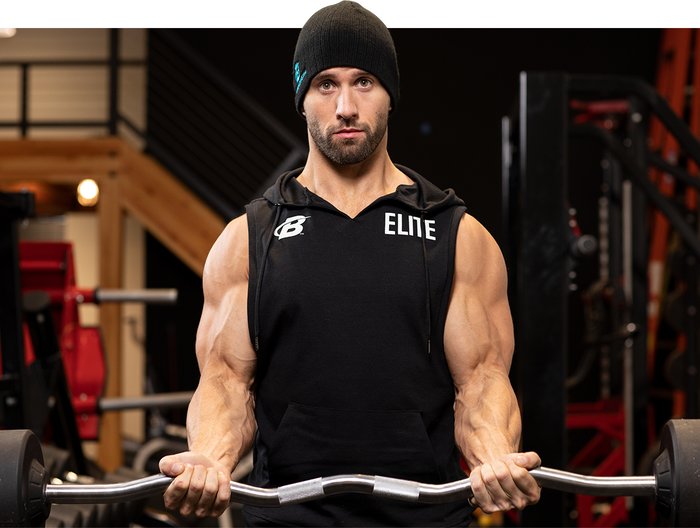
W-Bar Triceps Press-down/Seated Alternating Biceps Curl: For this superset, strive for a rep cadence of 1:0:1:2. That’s a 1-second negative with no pause at the end, then a 1-second positive and 2-second stop at the fully flexed position. Manipulating cadence stimulates the muscles in new ways, especially if you’ve fallen into a habit of using the same tempo for all your workouts.
Dumbbell Hammer Curl/Seated Dumbbell Overhead Extension: Change up your rep cadence to 4:0:1:2. Again, the first number is the time you should take on the eccentric in seconds, the second number is what you might consider the starting position (a zero means no pause between reps), the third is the concentric action when you actually do the most work, and the fourth is the peak contraction.
Barbell Wrist Curl/W-Bar Cable Curl/Diamond Push-Up: With these three exercises, you’re working from the smallest muscle group to the largest. By the time you hit push-ups, your arms should be screaming for mercy. For a truly excruciating burn, try to finish with a few extra shoulder-width push-ups. These are easier than the diamond version because your chest assumes more of the load.
Workout 5: Taylor Chamberlain’s Chest and Shoulder Smackdown
"Use this in place of your regular chest-and-delt workout if you’re in lean-out mode," recommends Chamberlain. "While it’s more like a standard muscle-building training routine, you’ll rev up the fat-burn a bit when you keep your rest periods under 30 seconds."
Taylor Chamberlain’s Chest and Shoulder Smackdown
Technique Tips
For all three pressing movements, increase the weight from set to set so you’re failing before 10 reps by the final set.

To hit the pectorals in a slightly different way, for the incline dumbbell press use a neutral grip (palms facing one another) versus the usual palms-forward position.
Take advantage of what dumbbells offer on the flat bench by going deep in the bottom position for a good stretch. The dumbbells should be alongside your torso at the bottom, at which point your elbows should be fully bent and pointing downward toward the floor.
On the front raises, avoid leaning away from the working arm as your shoulders begin to tire. Stagger your feet and keep an upright stance to keep the focus in your front delts.
For the lateral raises, keep the first 10 reps heavy by choosing a weight that will result in failure in the 8-10 rep range. Immediately switch to a lighter weight—around 30 percent lighter—and power through those additional 10 reps. Do this on every set before moving on to the upright rows. By this time your shoulders will be fatigued, so even though it burns, take your time and pause at the top of each upright row to emphasize the contraction.

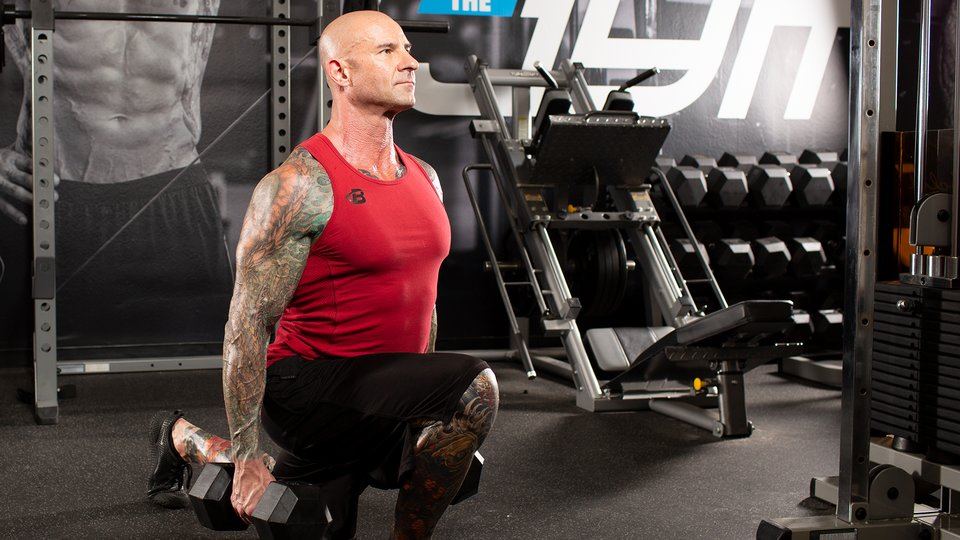


Leave a Reply
You must be logged in to post a comment.